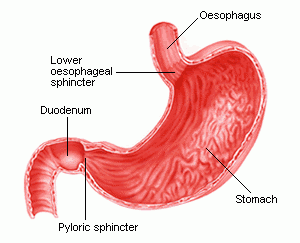
Do you suffer from indigestion, reflux, bloating, heartburn, irritable bowel, diarrhoea, gas, stomach pain, or stomach cramps? A common belief is that reflux, heartburn and GORD/GERD are caused by too much stomach acid, and so antacid products are now a multi-billion dollar industry. However, too much acid production is actually relatively rare, and around 90% of these problems are caused by not having enough stomach acid instead! Your body is totally dependent on the nutrients from your food, so if your digestive system is not working well, every part of your body will struggle.
Your stomach processes your food so that your intestines can break it down further and absorb all the nutrients. When functioning properly, the stomach produces a powerful hydrochloric acid, with a pH (acidity level) of 1.5 to 3.0. This is strong enough acid that if it were dropped onto a piece of wood it would burn a hole through the wood. The inner lining of the stomach is protected from its own acid by a thick layer of mucous, and epithelial cells that produce a bicarbonate solution to counteract the acid. Stomach acid serves 5 main purposes. It
The stomach also produces intrinsic factor, which binds to vitamin B12 and allows it to be absorbed in the small intestine. Vitamin B12 is an essential nutrient for the formation of red blood cells.
Your stomach is also a muscle, and it churns up the food and mixes it with the hydrochloric acid and enzymes. It is very common for stress to affect the muscles in the stomach.
This mixing the acid through the food continues until the mixture (called chyme) reaches the right pH, and this triggers the stomach muscles to move it into the small intestine. The high acidity of the chyme then triggers the release of other digestive enzymes from the pancreas (to continue with the digestive process) and sodium bicarbonate (to neutralize the chyme and prevent it from burning the small intestine).

The stomach has two valves, the lower esophageal sphincter (LES) at the top of the stomach, and the pyloric sphincter at the bottom. The pyloric sphincter is a one way valve, however the LES at the top is designed to open both ways. When too much pressure builds up in the stomach, but the pH is still not acidic enough for the pyloric sphincter to open, the body has only one option to release the pressure: opening up the LES. The release of the pressure into the esophagus causes the symptoms of heartburn and acid reflux. Even if you have low stomach acid, any amount of this acid going from the stomach into the esophagus will cause discomfort or pain, because your esophagus was never designed to handle stomach acid. If this happens regularly, the LES becomes weakened, making the problem worse.
Other causes of LES problems can include overeating, overweight or obesity, pregnancy, hiatal hernia, and many medications (including anti-inflammatories, antibiotics, bronchodilators, beta-blockers, antidepressants, and anti-anxiety drugs).
Low stomach acid also causes digestive problems downstream from the stomach in the small intestine. If the stomach is not able to produce enough acid to bring the pH level of the chyme to the correct level, eventually the stomach will be forced to move it through the pyloric sphincter into the small intestine. Because it is not at the proper pH, the chyme does not trigger the release of sodium bicarbonate, which can cause duodenal ulcers. The lower acidity of the chyme also doesn’t trigger the release of pancreatic enzymes. The small intestine is then not able to break down the chyme properly, and the large, undigested particles of food can disrupt the lining of the small intestine. The lining becomes more permeable, and allows the undigested food particles to enter your bloodstream, where your body’s immune system believes them to be foreign invaders instead of food. This triggers a systemic immune response that can lead to food sensitivities, inflammation, and autoimmune diseases (such as rheumatoid arthritis, Hashimoto’s thyroiditis, Graves’ disease, lupus, type 1 diabetes, or multiple sclerosis (MS)). This condition is known as leaky gut syndrome.
Some undigested food particles may continue into the large intestine, and this malabsorbed food can disrupt the normal gut flora. The large intestine may become inflamed and conditions such as constipation, diarrhoea, or irritable bowel syndrome could develop. Having the correct gut flora is also crucial for a good immune system.
Because low stomach acid can have such a profound impact on your overall health, the symptoms can affect many parts of your body. They can include
Heartburn
GORD/ GERD
Indigestion and bloating
Burping or gas after meals
Excessive fullness or discomfort after meals
Constipation and/or diarrhoea
Chronic intestinal infections
Undigested food in stools
Food allergies, intolerances, and sensitivities
Acne
Chronic fatigue
Mineral and nutrient deficiencies (including iron and/or vitamin B12 deficiency)
Dry skin or hair
Weak or cracked nails
Asthma
Depression
Osteoporosis
Any autoimmune disease
An American doctor, Jonathon Wright (author of the book “Why Stomach Acid is Good for You”), measured the stomach pH of thousands of patients in his clinic, and found that 90% of them had too little stomach acid. Stomach acid levels are said to decrease with age, but like many ‘age-related’ issues, low stomach acid can be corrected naturally with the right treatment.
As you can see, medications and drugs that suppress stomach acid are not an effective, safe, or smart way to address the causes of heartburn, indigestion or acid reflux, and over time can end up making these conditions worse instead.
Apple cider vinegar (ACV) can help stimulate stomach acid production. If you are not used to the taste and effects of ACV, it is best to include it into your diet gradually.
Apple cider vinegar is very acidic, so you need to dilute it to protect your teeth, throat and the lining of your stomach. Don’t drink undiluted ACV.
We have a brand of ACV at the clinic which we recommend.
If you have any digestive issue, please call now to book in for a complimentary Health Assessment with our Brisbane Naturopaths. We can then see what is going on in your body, what is working properly and what is not working properly, what is causing the problem, and how it can be resolved naturally.
Wright, J. & Lenard, L. (2001). Why Stomach Acid is Good for You: Natural Relief from Heartburn, Indigestion, Reflux, and GERD. Lanham, Maryland, The Rowman & Littlefield Publishing Group.
Valued at $120, your Assessment will help to uncover:
All this will be fully explained to you, and you can ask as many questions as you like. That way we can be sure to give you all of the right information, understanding and advice you need. Terms and conditions: This is a free, no obligation offer.